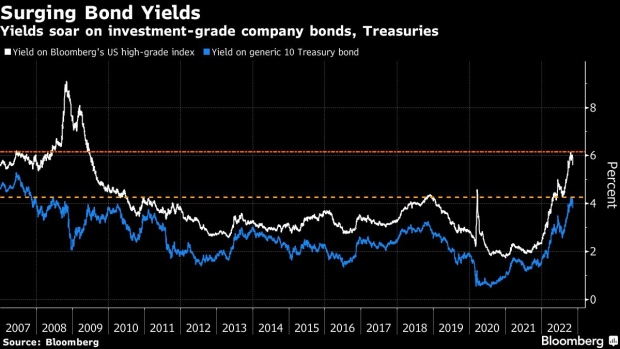Nov 14, 2022
Retail Traders Rush Into Bond Markets in Hunt for Juicier Yields
, Bloomberg News

(Bloomberg) -- Retail investors are pouring into debt markets, hoping to snap up some of the highest bond yields in more than a decade.
As the Federal Reserve pushes interest rates higher, bonds are emerging as a meaningful alternative to equities for everyday traders with an appetite for risk. The number of trades tripled to as many as 3,000 per day on Interactive Brokers Group Inc.’s retail-focused bond platform in the third quarter, compared to the same period a year earlier.
Individual retail investors are relatively small players in the massive US bond markets dominated by large institutional buyers. But the same factors drawing in the retail crowd now are also likely to pull in other investors -- including pension funds and insurance companies focused on locking in interest income over the long term.
“There continues to be more and more interest,” said Steve Sanders, executive vice president of marketing and product development at Interactive Brokers. “Before, when interest rates were low, there was not much there. Now I think people are saying with interest rates where they’re at, this should be part of our portfolio.”
Two of the biggest high-yield credit exchange-traded funds have also been attracting investors, who last week poured into the iShares iBoxx High Yield Corporate Bond ETF (ticker HYG) and SPDR Bloomberg High Yield Bond ETF (JNK) at a historic rate.
The Fed’s aggressive monetary tightening has sent the yield on 10-year Treasury bonds to hover around 4% after touching its highest since 2007, while corporate bonds pay a healthy interest premium on top of that. The average yield on a Bloomberg index of top-rated company bonds sits at 5.6%, just off the highest in more than 13 years.
That’s tempting for retail traders, especially those who already bought I bonds, the government’s ultra-safe, inflation-protected savings bonds that crashed the TreasuryDirect website with their popularity last month.
Read more: Biggest Junk-Bond ETFs Post Record Inflow in Dash Back to Risk
Of course, lofty yields in riskier credit markets come with the potential for losses. US investment-grade corporate bonds have lost around 18% this year on a total return basis as Fed officials fought inflation with rate hikes. While high-grade bond issuers are highly unlikely to default and cause losses for investors holding until maturity, those who want to sell the debt before then risk losses.
While US credit markets rallied on the possibility that signs of cooling US inflation could allow the Fed to take a less aggressive stance, policy makers have laid out plans for rates to move higher than earlier projected, albeit at a potentially slower pace.
“Given the pace of recent Fed rate hikes, we certainly have seen increased interest from our self-directed investors,” said Richard Carter, vice president of fixed income at Fidelity Investments.
Elsewhere in credit markets:
Americas
A group of banks led by Citigroup Inc. and Bank of America Corp. is preparing to fund about $5.4 billion of debt helping to finance the leveraged buyout of auto-parts maker Tenneco Inc., according to people with knowledge of the matter
- The decision comes as banks attempt to sell a portion of the debt package to investors in the form of $2.4 billion of leveraged loans and junk bonds
- Nine issuers are tapping the US high-grade market Monday in another busy day for new bond sales
- Dealers expect $25 billion to $30 billion of high-grade sales this week, with a heavy load likely on Monday
- Bed Bath & Beyond Inc. said it reached another privately negotiated exchange agreement, this time for several institutional bondholders to swap a total of $123 million of debt for equity
- U.S. credit ratings deteriorated last week as the main ratings companies issued 58 downgrades and 13 upgrades
- For deal updates, click here for the New Issue Monitor
- For more, click here for the Credit Daybook America
EMEA
There were 11 issuers with 14 tranches in Europe’s publicly syndicated debt market on Monday, with minimum issuance volume expected to be at €6.78 billion equivalent
- Italy’s billionaire Benetton family and investment firm Blackstone Inc. are set to move forward with their bid for infrastructure giant Atlantia SpA, even after their takeover offer fell just short of the required 90% shareholder threshold
- At least 604 companies filed for insolvency in the week ended Nov. 11, an increase of 3.6% from a year earlier, according to notices filed to the Gazette
- Rising global borrowing costs are denting the finances of some of the most climate-vulnerable countries right when they most need money to fight the devastating impacts of global warming
- Investors are trying to dump Orpea SA’s debt before the French care-home operator comes out with a restructuring plan next week
Asia
China’s property rescue measures prompted a further rally in dollar bonds of Chinese developers Monday, and fueled gains in broader Asia corporate debt as well
- Junk dollar notes of developers soared at least 5 cents on the dollar Monday morning, after a Bloomberg index dominated by such notes rose last week for the first time in eight weeks; yield premiums in high-grade Asia dollar bonds narrowed at least 4 basis points, traders said
- The gains reflect optimism that China’s real estate sector, rattled by slumping demand and record defaults, may soon see a bottom; Chinese developers’ shares also surged
- The cost to insure Asian bonds against nonpayment with credit-default swaps dropped, with a CDS index on track to extend its decline to a seventh straight session; that’s the longest streak in 11 months, according to Bloomberg-compiled data
- The Markit iTraxx Asia ex-Japan IG CDS index fell at least 7bps Monday, according to CDS traders
- Primary market deals were subdued at the start of the week, with just Nanjing Yangzi State-owned Investment Group marketing a three-year dollar bond
©2022 Bloomberg L.P.






